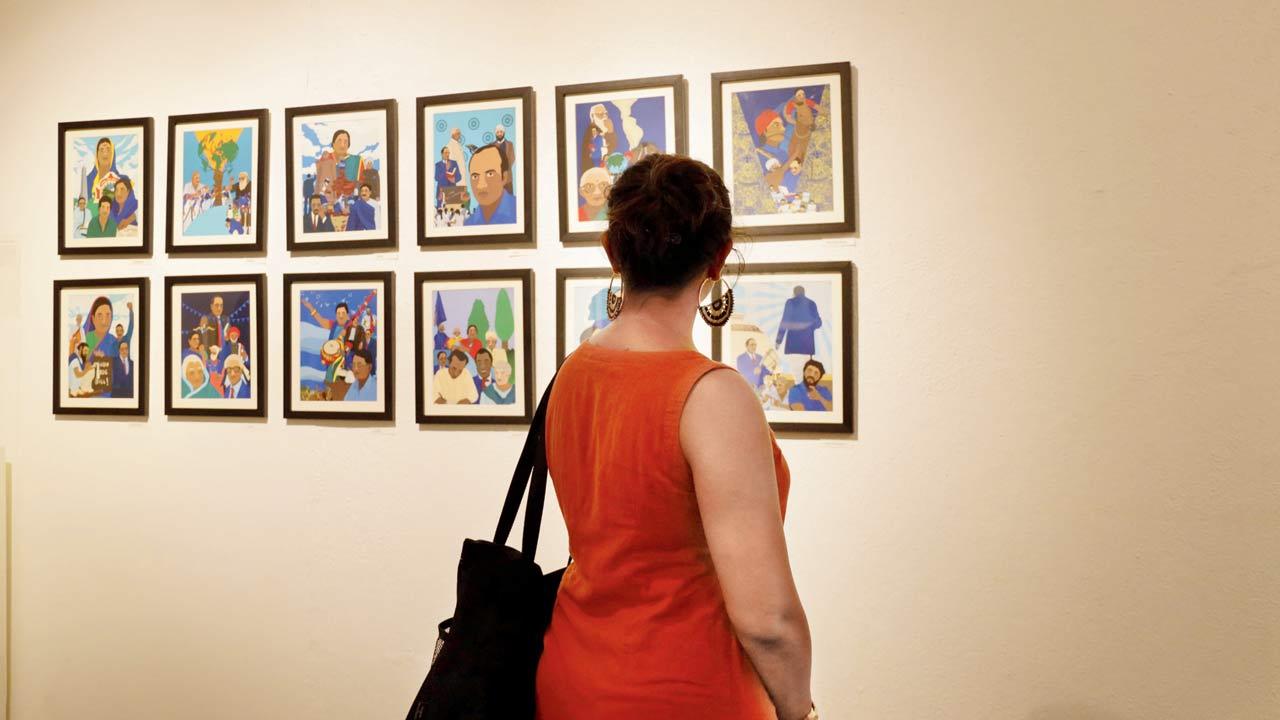Artist Siddhesh Gautam traces what freedom means for the Dalit and Bahujan communities through their heroes and his ancestors

A mirror at the exhibition that asks people to write what freedom means to them
Most wouldn’t question the freedom of pursuing spirituality, but for a Bahujan or Dalit, it is not so black and white, to say the least,” says Siddhesh Gautam, “For many Dalits, true Independence Day came on January 26, 1950. It was the day untouchability was abolished and made a punishable offence.”
ADVERTISEMENT
The 33-year-old’s first solo multi-media exhibition is currently underway at the Museum of Goa in Pilerne, Goa. It comprises moving illustrations, as well as family objects that speak of the experience of being a Dalit in India.
“Baba Saheb” (Dr B R Ambedkar) features extensively in his work, and this exhibition, as well as social reformers such as Jyotirao Phule, Phoolan Devi and Rohith Vemula.
 Siddhesh Gautam
Siddhesh Gautam
More than anything else, Gautam addressed the human condition. “As the title suggests—We The People (too)—is borne of the thought about how freedom is variable and comes within the parameters of class and caste (both go hand in hand). It starts with examining the freedom of practising spiritualism within the anti-caste history of India,” the National Institute of Design (NID), Ahmedabad-graduate tells us over the phone from Delhi.
The illustration that hits this mark is the one showing a woman’s bloodied hand reaching out to ring temple bells that are chained, rendering them immovable, and thus un-ringable.
Gautam allows himself to be vulnerable by bringing in ancestral history and making this endeavour more personal than just pieces hung on the wall. In the middle of the exhibition is the first-ever book that his family owned, a feat accomplished by his grandfather that eventually led to his father getting a formal education.
 The illustrations by the artist are an homage to his real life heroes
The illustrations by the artist are an homage to his real life heroes
“I also separated my grandfather’s belongings from those owned by my grandmother, the latter had relatively fewer items—a scathing indictment of how patriarchy is more tangible through the caste lens,” he says, adding, “Mind you, our house was quite small; we didn’t have the luxury of cherishing objects and handing them down to the next generation.”
One of the few belongings Gautam inherited was a box of “silver coins”. “The box was willed to me (orally) by my grandmother and I went to trace it recently. I was told it was silver coins but I wasn’t sure if that was a family legend, because I never found it. Instead, I found a box with old 10 and 20 paisa coins. When I examined them closely, I saw one minted in 1947 with a British emblem on it. She had collected coins minted in years of historical significance. There is a big gap in the 1970s, and I was informed that no coins were minted then. This is how my family experienced freedom—through education, currency and even a walking stick that my grandfather owned which was made in the United Kingdom. It’s a mystery how he got it.” In the exhibition, the cane is placed on the arm of an old wooden chair.
Almost reading our minds, Gautam tells us art became his medium of expression. “My grandfather lost both his parents at different points by the time he was five years old,” he says, “So he commissioned a local artist to paint their portraits, guided only by a few flashes of memories and his imagination. I grew up looking at them. It was my first introduction to art and what it can mean to a person.”
Does he fear being stereotyped a Dalit artist? “At first maybe. I feel that posthumously, it will be evident that my work is beyond that—it is about gender, global warming, mental health. I’m not afraid of being boxed in anymore; I am too strong for that to stop me,” he says with a humourless chuckle.
 Subscribe today by clicking the link and stay updated with the latest news!" Click here!
Subscribe today by clicking the link and stay updated with the latest news!" Click here!







